A bishop is an ordained member of the clergy who is entrusted with a position of authority and oversight in a religious institution. In Christianity, bishops are normally responsible for the governance and administration of dioceses. The role or office of the bishop is called episcopacy. Organizationally, several Christian denominations utilize ecclesiastical structures that call for the position of bishops, while other denominations have dispensed with this office, seeing it as a symbol of power. Bishops have also exercised political authority within their dioceses.

An episcopal polity is a hierarchical form of church governance in which the chief local authorities are called bishops. The word "bishop" here is derived via the British Latin and Vulgar Latin term *ebiscopus/*biscopus, from the Ancient Greek ἐπίσκοπος epískopos meaning "overseer". It is the structure used by many of the major Christian Churches and denominations, such as the Catholic, Eastern Orthodox, Oriental Orthodox, Church of the East, Anglican, Lutheran and Methodist churches or denominations, and other churches founded independently from these lineages.

The Eastern Orthodox Church, officially the Orthodox Catholic Church, and also called the Greek Orthodox Church or simply the Orthodox Church, is the second-largest Christian church, with approximately 220 million baptised members. It operates as a communion of autocephalous churches, each governed by its bishops via local synods. The church has no central doctrinal or governmental authority analogous to the head of the Catholic Church. Nevertheless, the Ecumenical Patriarch of Constantinople is recognised by them as primus inter pares, a title formerly given to the patriarch of Rome. As one of the oldest surviving religious institutions in the world, the Eastern Orthodox Church has played an especially prominent role in the history and culture of Eastern and Southeastern Europe.

Ecumenism – also called interdenominationalism, or ecumenicalism – is the concept and principle that Christians who belong to different Christian denominations should work together to develop closer relationships among their churches and promote Christian unity. The adjective ecumenical is thus applied to any non-denominational initiative that encourages greater cooperation and union among Christian denominations and churches.
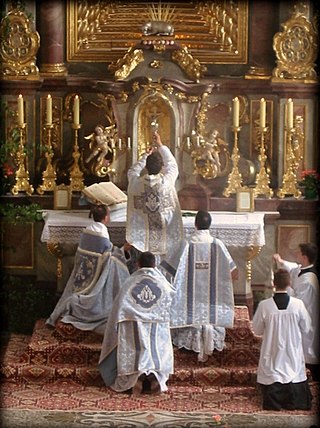
Traditionalist Catholicism is a movement encompassing members of the Catholic Church and offshoot groups of the Catholic Church that emphasizes beliefs, practices, customs, traditions, liturgical forms, devotions and presentations of teaching associated with the Catholic Church before the Second Vatican Council (1962–65). Traditionalist Catholics particularly emphasize the Tridentine Mass, the Roman Rite liturgy largely replaced in general use by the post-Second Vatican Council Mass of Paul VI.

Closed communion is the practice of restricting the serving of the elements of Holy Communion to those who are members in good standing of a particular church, denomination, sect, or congregation. Though the meaning of the term varies slightly in different Christian theological traditions, it generally means that a church or denomination limits participation either to members of their own church, members of their own denomination, or members of some specific class. This restriction is based on various parameters, one of which is baptism. See also intercommunion.

The Palmarian Church, officially registered as the Palmarian Christian Church and also known as the Palmarian Catholic Church, is a Christian church with an episcopal see in El Palmar de Troya, Andalusia, Spain. The Palmarian Church claims to be the exclusive One, Holy, Catholic and Apostolic Church founded by Jesus Christ. It claims that the Holy See, the institution of the Papacy and the headquarters of the Catholic Church was moved to El Palmar de Troya at the Cathedral-Basilica of Our Crowned Mother of Palmar, under the auspices of the Patriarchate of El Palmar de Troya, in 1978, due to the apostasy of the Roman Catholic Church from the Catholic faith.
The Hong Kong Sheng Kung Hui (abbreviated SKH), also known as the Hong Kong Anglican Church (Episcopal), is the Anglican church in Hong Kong and Macao. It is the 38th Province of the Anglican Communion. It is also one of the major denominations in Hong Kong and the first in the Anglican Communion to ordain a female priest.

The Diocese of Worcester is a Latin Church ecclesiastical territory, or diocese, of the Catholic Church in central Massachusetts in the United States. The diocese consists of Worcester County. It is a suffragan diocese in the ecclesiastical province of the metropolitan Archdiocese of Boston. The patron saint of the diocese is Paul the Apostle.
The Charismatic Episcopal Church (CEC), officially the International Communion of the Charismatic Episcopal Church (ICCEC), is a Christian denomination established in 1992. The ICCEC is a part of the Convergence Movement. Within North America, most of the Charismatic Episcopal Church's congregations and missions are located within the Northern, Southeastern, Midwest, and Western United States; it also has a presence in Texas, and in Western Canada.
Catholicity is a concept of pertaining to beliefs and practices that are widely accepted by numerous Christian denominations, most notably by those Christian denominations that describe themselves as catholic in accordance with the Four Marks of the Church, as expressed in the Nicene Creed formulated at the First Council of Constantinople in 381: "[I believe] in one, holy, catholic, and apostolic Church." The English adjective catholic is derived from the Ancient Greek adjective καθολικός, meaning "general", "universal". Thus, "catholic" means that in the Church the wholeness of the Christian faith, full and complete, all-embracing, and with nothing lacking, is proclaimed to all people without excluding any part of the faith or any class or group of people. An early definition for what is "catholic" was summarized in what is known as the Vincentian Canon in the 5th century Commonitory: "what has been believed everywhere, always, and by all."
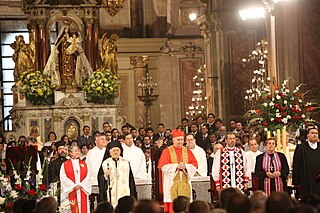
The Catholic Church has engaged in the modern ecumenical movement especially since the Second Vatican Council (1962–1965) and the issuing of the decree Unitatis redintegratio and the declaration Dignitatis humanae. It was at the Council that the Pontifical Council for Promoting Christian Unity was created. Those outside of the Catholic Church were categorised as heretics or schismatics, but in many contexts today, to avoid offence, the euphemism "separated brethren" is used.
Branch theory is an ecclesiological proposition that the One, Holy, Catholic, and Apostolic Church includes various different Christian denominations whether in formal communion or not. The theory is often incorporated in the Protestant notion of an invisible Christian Church structure binding them together.
The Convergence Movement, also known as the Ancient-Future Faith, whose foundation is primarily attributed to Robert E. Webber in 1985, is an ecumenical movement. Developed as an effort among evangelical, charismatic and Pentecostal, and liturgical Christians and denominations blending their forms of worship, the movement has been defined for its predominant use of the Anglican tradition's Book of Common Prayer; use from additional liturgical sources common to Lutheranism, Eastern Orthodoxy, and Catholicism have also been employed.
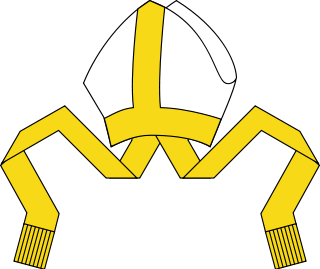
Timothy Anthony McDonnell is an American prelate of the Roman Catholic Church. McDonnell served as bishop of the Diocese of Springfield in Massachusetts from 2004 to 2014 and as an auxiliary bishop of the Archdiocese of New York from 2001 to 2004.

Jesse Delano Ellis, II, commonly known as J. Delano Ellis, was an American Protestant religious leader and progenitor of unity among African American Pentecostals with Trinitarian and nontrinitarian affinities.

Thomas John Joseph Paprocki is an American prelate of the Catholic Church who has been serving as bishop of the Diocese of Springfield in Illinois since 2010. He previously served as an auxiliary bishop of the Archdiocese of Chicago in Illinois from 2003 to 2010.
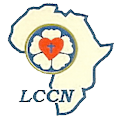
The Lutheran Church of Christ in Nigeria (LCCN) is a major Lutheran denomination in Nigeria, a member of the Lutheran World Federation (LWF).
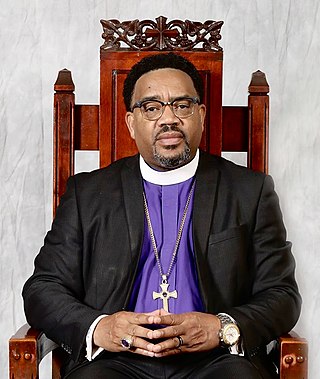
Talbert Wesley Swan II is an American religious leader. He is a prelate in the Church of God in Christ serving as the bishop of the Vermont Ecclesiastical Jurisdiction in the United States. Swan is the fifth leader of the Jurisdiction and oversees COGIC congregations in Vermont, Massachusetts, New Hampshire, Connecticut, and New York. Swan serves the Church of God in Christ as Assistant General Secretary and Director of Social Justice Ministry. Swan is also the National Chaplain of Iota Phi Theta Fraternity, Inc. and the host of a radio talk show, The Spoken Word.

The Russian True Orthodox Church, also called lazarites or tikhonites, is an independent Russian Orthodox church professing True Orthodoxy. It was formed in 2002 by Archbishop Lazar (Zhurbenko) and Bishop Benjamin (Rusalenko), the two hierarchs of ROCOR inside the territory of Russia, who refused the process of unification of the ROCOR with the Moscow Patriarchate; Lazar and Benjamin therefore joined the ROCOR (V), then left it thereafter and thus their Church became independent.














